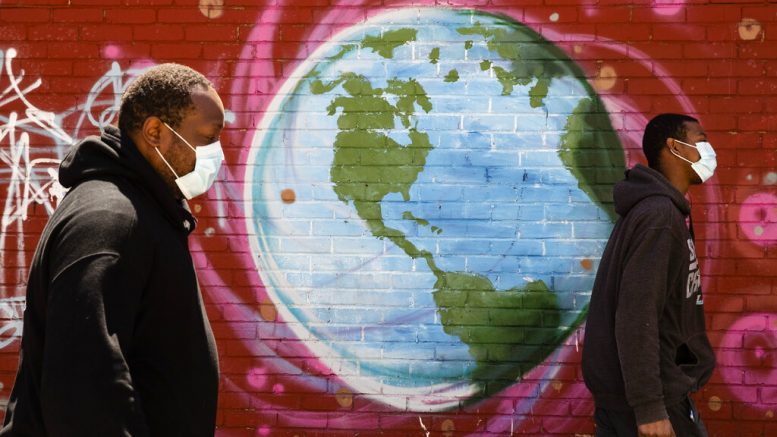HARRISBURG (AP) — Residents of northcentral and northwestern Pennsylvania are projected to be the first in the state to be released from Gov. Tom Wolf’s stay-at-home order, and many retail stores in those areas should be able to reopen, under a statewide plan announced Wednesday night.
Wolf wants to begin easing some pandemic restrictions on May 8 in areas of Pennsylvania that have been lightly impacted by the new coronavirus.
His reopening plan said a region or county will need to average fewer than 50 new positive cases of the virus per 100,000 residents for 14 days in order to begin moving out from under his statewide lockdown. Many counties in rural Pennsylvania have reported fewer than 20 cases total.
“We’re trying to be prudent and careful and we want to keep people safe,” Wolf said at a video news conference Wednesday night.
The virus has infected more than 35,000 people in Pennsylvania and killed more than 1,600, but Wolf, a Democrat, says the state has made sufficient progress in its fight against COVID-19 to begin a gradual loosening of restrictions. Republican lawmakers are pressing for a more aggressive timetable.
As the virus begins to ebb, and each county or region meets the state’s case reporting threshold, residents will be permitted to leave their homes and in-person retail will be allowed to resume, according to Wolf’s plan.
The plan lays out a phased, color-coded reopening roadmap and, right now, all of Pennsylvania is at “red,” meaning that all 12.8 million residents are under orders to stay home and all “non-life-sustaining” businesses are closed. Regions and counties will move from red to yellow, and then, eventually, to green, meaning that all pandemic restrictions are lifted, aside from any federal or state health guidelines that remain in effect.
But even under yellow, a ban on gatherings of over 25 people will remain, and gyms, casinos, theaters and other indoor recreational, wellness and entertainment venues will stay closed. Restaurants and bars will still be limited to carry-out or delivery, and businesses must follow federal and state guidance for social distancing and cleaning.
Some details have not been worked out, Wolf said, such as whether hairdressers and barbers can resume under yellow. And a metric to move from yellow to green has not been worked out either, Wolf said.
Wolf also pushed up the date that limited building construction work may resume statewide, from May 8 to May 1. But he cautioned that if the virus flares up again in a certain county or region, residents would be ordered back home and businesses would have to shut down again.
Schools will remain closed for the rest of the academic year.
Other coronavirus-related developments in Pennsylvania:
VOTE-BY MAIL
The Wolf administration is encouraging voters to cast their primary election ballots by mail, saying it would help prevent the spread of the new coronavirus, but faced legal action Wednesday by a liberal group demanding greater protections against disenfranchisement.
The Wolf administration has sent 4.2 million postcards to primary voters and is mounting a vote-by-mail awareness campaign on radio, television, social media, streaming services, mobile apps and email, officials said Wednesday.
The state’s efforts to get voters to apply for a mail-in ballot or absentee ballot have gained traction, with more than 462,000 voters applying for a mail-in ballot and more than 139,000 applying for an absentee ballot, according to Wolf administration figures.
Republican and Democratic party officials in Pennsylvania have encouraged people to vote by mail amid concerns the virus will make it difficult for county officials to find polling places and get poll workers to staff them. Election officials in various counties say they probably will be forced to operate far fewer polling places than normal.
In its lawsuit, the labor-backed Pennsylvania Alliance for Retired Americans seeks to have the state provide prepaid postage for all mail ballots; count ballots received after 8 p.m. on Election Day if the delay was caused by a disruption in mail service; and allow third parties to assist voters in submitting their sealed ballots.
State officials have “failed to implement adequate safeguards to ensure a free and fair election” in the face of the pandemic, said the suit, filed in Commonwealth Court.
An email was sent to Wolf’s spokeswoman seeking comment.
CASES
Pennsylvania’s COVID-19 death toll rose by 58 to 1,622, the state health department reported Wednesday, with more than 1,150 additional people testing positive for the virus that causes the disease.
Statewide, more than 35,600 people have tested positive, according to the latest health department data. The number of infections is thought to be far higher because many people have not been tested, and studies suggest people can be infected with the virus without feeling sick.
For most people, the virus causes mild or moderate symptoms that clear up in a couple of weeks. Older adults and people with existing health problems are at higher risk of more severe illness, including pneumonia, or death.
HOSPITALS FACE $10 BILLION HIT
The new coronavirus could cost Pennsylvania hospitals more than $10 billion this year, a trade group said Wednesday, repeating its call for the Wolf administration and state lawmakers to provide tax relief and other financial support.
An analysis commissioned by The Hospital and Healthsystem Association of Pennsylvania said the cancellation of elective surgeries and deferral of medical treatments — from which hospitals derive a large portion of their income — resulted in a nearly $1 billion revenue hit in March alone. Many hospitals and health networks have already furloughed and laid off workers, and the report warned that some hospitals might have to close.
“We are calling on the governor and the legislature to act now,” Andy Carter, the group’s president and CEO, told reporters on Wednesday.
Pennsylvania hospitals said they expect to get more than $3 billion in federal coronavirus funding, leaving them with a projected net loss from the pandemic of $7 billion this year without tax relief and additional government aid.
A Wolf administration spokeswoman said the state government has taken several steps to support hospitals, creating a $450 million short-term loan program and buying personal protective gear and other equipment for hospitals and nursing facilities.
NAMES OF PATIENTS
Two police unions have sued the Erie County Department of Health to force it to disclose for emergency responders the names, and not just the addresses, of people with a COVID-19 diagnosis under isolation.
The lawsuit, filed Wednesday by unions representing 173 officers in Erie city and about 200 officers in other Erie County police departments, centers on how much information is provided by the health department to the county 911 center.
Dispatchers pass along the information to police and others, at their request, when they are summoned to respond.
The county’s solicitor, Richard Perhacs, said the current practice matches that of other counties in Pennsylvania. County Executive Kathy Dahlkemper told the Erie Times-News that it protects the public while respecting patients’ privacy rights.
Perhacs said about 25 people in Erie County are currently under isolation with a COVID-19 diagnosis.
The lawsuit claims current policy violates the county health agency’s requirement to prevent and control the spread of disease and puts officers at risk of infection.






































